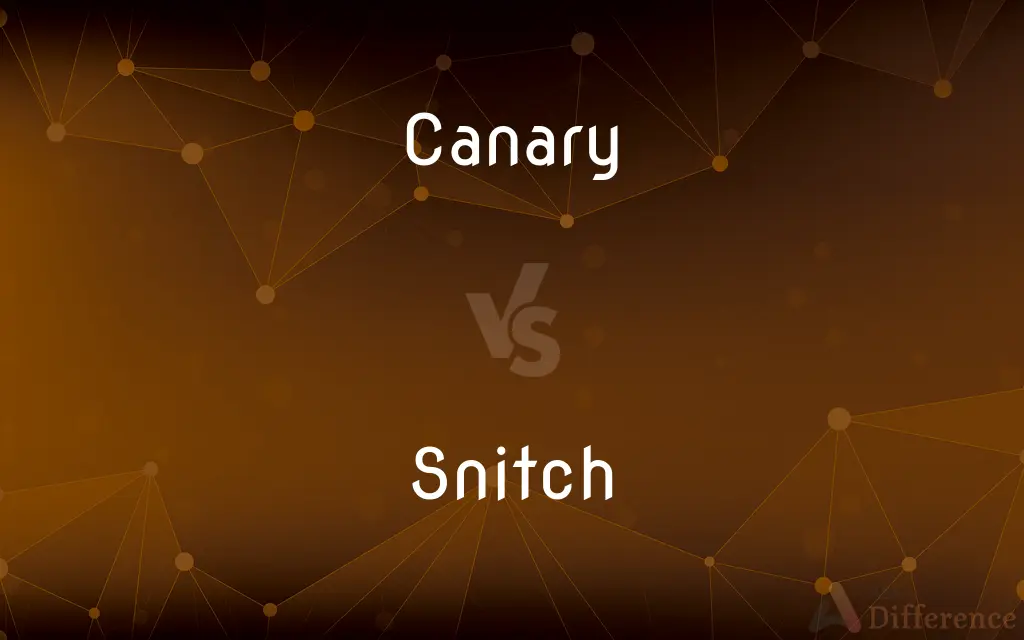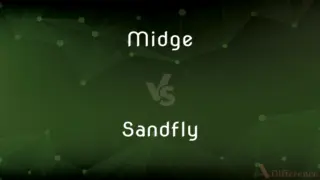Canary vs. Snitch — What's the Difference?
Edited by Tayyaba Rehman — By Urooj Arif — Updated on March 7, 2024
A canary is often a warning or indicator, especially in safety contexts, while a snitch is someone who informs authorities about others' wrongdoings.

Difference Between Canary and Snitch
Table of Contents
ADVERTISEMENT
Key Differences
A canary, historically, refers to the use of canaries in coal mines to detect toxic gases, serving as an early warning system for miners' safety. This term has evolved to symbolize any early warning or indicator of potential danger in various contexts. On the other hand, a snitch is a person who secretly informs authorities or figures of authority about the illegal or unethical activities of others. This action often carries negative connotations, implying betrayal or disloyalty among peers.
While the canary plays a crucial role in preventing harm by signaling danger before it becomes apparent to humans, a snitch exposes actions or information that might not be immediately visible to those in authority, potentially preventing further illegal or harmful activities. However, the motivations behind a canary's role are inherently neutral and protective, whereas a snitch's motives can be varied, ranging from self-preservation to seeking favor with authorities.
The term "canary" in modern usage extends beyond physical safety and can refer to any mechanism or system designed to alert to potential problems, such as in computer security, where a "canary token" might indicate a data breach. Meanwhile, snitches operate in social, organizational, and legal contexts, where their information can lead to investigations, arrests, or social ostracism.
Both canaries and snitches provide critical information that can prevent harm or intervene in dangerous situations. However, canaries are passive indicators without agency, while snitches actively choose to relay information, often facing moral and ethical dilemmas in their decision to report.
The difference in perception between canaries and snitches is significant. Canaries are generally viewed positively, as their presence and function are intended for safety and protection. In contrast, snitches are often viewed with suspicion or disdain, especially in cultures or groups that value loyalty and discretion.
ADVERTISEMENT
Comparison Chart
Primary Context
Safety and warning systems
Informing on others' wrongdoings
Role
Passive indicator of danger
Active informer to authorities
Perception
Generally positive, protective
Often negative, associated with betrayal
Motivation
Inherent to its function (non-volitional)
Can vary, including self-preservation or seeking favor
Application
Historical: coal mines; Modern: various warning systems
Social, organizational, and legal contexts
Compare with Definitions
Canary
Symbolizes any early warning system.
Economic indicators serve as the canary in the coal mine for recessions.
Snitch
Often viewed negatively within social groups.
Being labeled a snitch ostracized him from the community.
Canary
Passively protects by alerting to hazards.
The environmental canary signs warned of the contaminated water source.
Snitch
Acts out of various motivations, including self-interest.
The snitch revealed the plot in hopes of a reduced sentence.
Canary
Represents protective measures without agency.
The software's canary feature helps identify system failures promptly.
Snitch
Someone who informs on others' illegal activities.
The snitch reported the theft to the authorities, leading to arrests.
Canary
Used in computer security to indicate breaches.
A canary token alerted us to the unauthorized access of our systems.
Snitch
Faces moral and ethical dilemmas.
The individual struggled with the decision to snitch on their coworker.
Canary
A safety mechanism signaling danger, like toxic gases in mines.
The canary in the coal mine saved lives by detecting gas early.
Snitch
Operates in various contexts, affecting outcomes.
The snitch's information was crucial in dismantling the criminal organization.
Canary
A small finch (Serinus canaria) native to the Canary Islands that is greenish to yellow and has long been bred as a cage bird.
Snitch
Steal
He snitched the umbrella for when he went fishing
She was snitching a look out of the window
Canary
A woman singer.
Snitch
Inform on someone
She wouldn't tell who snitched on me
Canary
An informer; a stool pigeon.
Snitch
An informer
They thought he was a plant or a snitch
Canary
A sweet white wine from the Canary Islands, similar to Madeira.
Snitch
To act as an informer
He snitched on his comrades.
Canary
A light to moderate or vivid yellow.
Snitch
To steal (something, usually something of little value); pilfer
Snitched a cookie from the counter.
Canary
A small, usually yellow, finch (genus Serinus), a songbird native to the Canary Islands.
Snitch
An informer.
Canary
Any of various small birds of different countries, most of which are largely yellow in colour.
Snitch
A thief.
Canary
(informal) A female singer, soprano, a coloratura singer.
Snitch
(intransitive) To inform on, especially in betrayal of others.
Canary
(slang) An informer or snitch; a squealer.
Snitch
To contact or cooperate with the police for any reason.
Canary
A light, slightly greenish, yellow colour.
Snitch
To steal, quickly and quietly.
Canary
(slang) A (usually yellow) capsule of the short-acting barbiturate pentobarbital/pentobarbitone (Nembutal).
Snitch
(slang) A thief.
Canary
A yellow sticker applied by the police to a vehicle to indicate it is unroadworthy.
Snitch
(slang) An informer, one who betrays his group.
Canary
Any test subject, especially an inadvertent or unwilling one. (From the mining practice of using canaries to detect dangerous gases.)
Snitch
A nose.
Canary
(computing) A value placed in memory such that it will be the first data corrupted by a buffer overflow, allowing the program to identify and recover from it.
Snitch
A tiny morsel.
Canary
(computing) A change that is tested by being rolled out first to a subset of machines or users before rolling out to all.
Snitch
A ball used in the sport of Quidditch.
Canary
A light, sweet, white wine from the Canary Islands.
Snitch
Someone acting as an informer or decoy for the police
Canary
A lively dance, possibly of Spanish origin (also called canaries).
Snitch
Take by theft;
Someone snitched my wallet!
Canary
Of a light yellow colour.
Snitch
Give away information about somebody;
He told on his classmate who had cheated on the exam
Canary
(intransitive) to dance nimbly (as in the canary dance)
Canary
(slang) to inform or snitch, to betray secrets, especially about illegal activities.
Canary
(computing) to test a software change by rolling out to a small set of machines or users before making it available to all.
Canary
Of or pertaining to the Canary Islands; as, canary wine; canary birds.
Canary
Of a pale yellowish color; as, Canary stone.
Canary
Wine made in the Canary Islands; sack.
Canary
A canary bird.
Canary
A pale yellow color, like that of a canary bird.
Canary
A quick and lively dance.
Make you dance canaryWith sprightly fire and motion.
Canary
To perform the canary dance; to move nimbly; to caper.
But to jig of a tune at the tongue's end, canary to it with your feet.
Canary
Someone acting as an informer or decoy for the police
Canary
A female singer
Canary
A moderate yellow with a greenish tinge
Canary
Any of several small Old World finches
Canary
Having the color of a canary; a light to moderate yellow
Common Curiosities
What was the original use of canaries?
Canaries were originally used in coal mines to detect toxic gases as an early warning system for miners' safety.
How is a canary different from a whistleblower?
A canary is a passive warning system without volition, while a whistleblower is an individual who actively exposes wrongdoing within an organization, often at personal risk.
What are the risks of being a snitch?
Risks include social ostracism, retaliation from those informed upon, and ethical dilemmas regarding loyalty and justice.
Is being a snitch always considered negative?
While often viewed negatively, the perception of a snitch can vary depending on the context and the outcomes of their information.
Why might someone choose to snitch?
Someone might choose to snitch for various reasons, including self-preservation, seeking favor with authorities, or a sense of moral obligation.
Are there any protections for snitches?
Protections vary but can include anonymity, legal immunity, or witness protection, especially in significant legal cases.
What modern technologies use the canary concept?
Modern technologies, especially in computer security, use "canary tokens" or similar mechanisms to alert administrators to data breaches or system intrusions.
Can the role of a snitch have positive outcomes?
Yes, snitching can lead to positive outcomes, such as preventing crime, ensuring safety, and upholding justice.
What motivates a canary in its warning role?
Canaries do not have motivations; they are used metaphorically to describe systems designed to give early warnings.
What ethical considerations come with snitching?
Ethical considerations include balancing personal morals, loyalty to peers, and the greater good of preventing harm or injustice.
Can canaries still be used as warnings today?
While not literally, the concept of a "canary" as an early warning system is still used today in various forms, including environmental indicators and computer security.
How are snitches treated in legal contexts?
In legal contexts, snitches can be valuable for investigations but may also be protected or incentivized through deals or witness protection programs.
What symbolizes a modern-day canary?
In modern-day, early warning systems in technology, environmental monitoring, and financial indicators can all serve as the metaphorical "canary in the coal mine."
Do canaries still hold relevance in modern safety measures?
Yes, as a metaphor, the concept of the canary is still relevant in designing systems and technologies that alert to dangers early.
How has the perception of snitches evolved?
The perception of snitches has evolved with societal norms and values, though it remains complex and context-dependent.
Share Your Discovery

Previous Comparison
Telegram vs. Cablegram
Next Comparison
Midge vs. SandflyAuthor Spotlight
Written by
Urooj ArifUrooj is a skilled content writer at Ask Difference, known for her exceptional ability to simplify complex topics into engaging and informative content. With a passion for research and a flair for clear, concise writing, she consistently delivers articles that resonate with our diverse audience.
Edited by
Tayyaba RehmanTayyaba Rehman is a distinguished writer, currently serving as a primary contributor to askdifference.com. As a researcher in semantics and etymology, Tayyaba's passion for the complexity of languages and their distinctions has found a perfect home on the platform. Tayyaba delves into the intricacies of language, distinguishing between commonly confused words and phrases, thereby providing clarity for readers worldwide.
















































